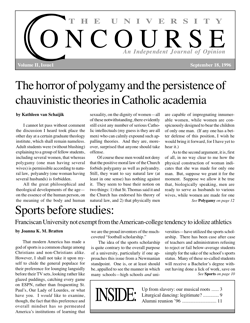God and grunge revisited
by Richard Fougerousse
In the May 7 issue of the Concourse, Nicholas J. Healy, Jr. pointed out that there is a sharp discrepancy between the inward beliefs and outward manners of our student body, and he eloquently urged us to establish an authentically Christian culture on our campus.
I would like to add an historical perspective to his argument. One might well ask what history has to do with God and grunge at Franciscan University. The answer is, I think, translucent in its simplicity. History is a cultural tradition enduring and progressing through time. When an ancient Roman acted, Ortega y Gasset once wrote, he clothed himself, not only in the virtues, but in the garb of his ancestors. The so-called grunge-culture, on the other hand, represents a radical break with tradition, a severing of our roots.
Throughout the successive phases of the development of medieval culture, we can see a continuing historical movement towards a realization, however imperfect, of the ideal of St. Augustine’s City of God. The medieval world sacramentalized culture. As Christopher Dawson has pointed out, in the Middle Ages the Catholic religion and European culture were in a state of communion. Religion found its expression in every aspect of medieval culture, not only in its institutions and literature and philosophy, but also in its architecture and art and dress and music, in its manners and moral teachings. All these modes of expression—whether The Divine Comedy of Dante, the Gothic cathedral at Chartres, the Gregorian chant, the habits of the religious orders, the holy chivalry of St. Francis of Assisi, or the intellectual synthesis of St. Thomas Aquinas—taught the same lesson and expressed the same truth. This multi-media evangelization was nothing else than the source of a dynamic religious and cultural unity in the High Middle Ages.
G. K. Chesterton, Eric Voegelin and Christopher Dawson all point to a gnostic spirit of revolution as a major contributing factor in the break-up of the medieval unity. This revolutionary ethos produces a desacralized culture. It results in a dualism and a hostility between religion and culture that precludes any possibility of cooperation and collaboration between them. Gnosticism finds its expression in every aspect of revolutionary culture, in its institutions, its literature and philosophy, its architecture, art, music and dress, as well as in its manners and moral teachings. All these modes of expression—whether influenced by the thought of Voltaire, Robespierre, Marx, Stalin, Nietzsche, Hitler, Freud or Timothy Leary—teach a large number of widely varying doctrines, yet they express the same deep rooted error—philosophical and religious pessimism; that is, a belief in the essential evil of this present existence. The theme is always the same; destruction of the old world and passage to the new. This is the source of the great religious and cultural fragmentation of the revolutionary age.
This is why we find ourselves living in the era of the collective split personality, a phenomenon which is analogous to what T.S. Eliot called the dissociation of sensibilities. While our religion may be Catholic, our culture is gnostic. We believe in the truths of the Faith, but our young wear the uniform of the revolution, all unknowing. We accept the teachings of the Magisterium, yet, embarrassingly, our dress and manners and music are those of the cultural revolution of the sixties, which was nothing other than the latest phase of the larger revolution.
A restoration of standards in dress and manners is thinkable only in terms of a general restoration of the union of religion and culture. It must become fashionable to love the good, the true and the beautiful. Mr. Healy’s insight penetrates to the heart of the matter when he reminds us that the Holy Father has urged us to form a civilization of love. And what better place could there be to begin taking seriously the wild possibility of such a thing, with the help of grace transforming nature, in total abandonment to divine providence, than the Franciscan University of Steubenville?
Richard Fougerousse
Mr. Fougerousse is the Assistant Director of the Austrian Program, Vice-President of the Pro-Life Association of Lower Austria, and Instructor of History on the Gaming Campus.


